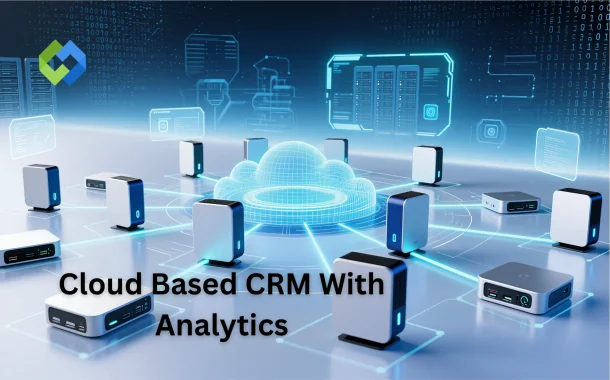The benefits of using cloud-based CRM are clear. It saves time by keeping all data organized in one system. It lowers costs because there is no need for physical servers or complex IT setups. It improves customer service by providing quick access to customer history and interactions. It also helps in making better decisions using insights from data.
Table of Contents
Table of Contents
What CRM Analytics Can Do
CRM analytics helps businesses understand their customers and make smarter decisions. It collects data from customer interactions, sales, and marketing activities. By analyzing this data, businesses can see patterns, trends, and behaviors that show what is working and what needs improvement. This helps teams focus on actions that bring better results.
One key use of CRM analytics is tracking sales performance. It shows which products or services are selling well and which customers are most engaged. It can also measure the success of marketing campaigns, helping businesses understand which strategies attract more leads and drive conversions.
CRM analytics also allows businesses to segment customers. By grouping customers based on behavior, preferences, or purchase history, teams can create more personalized offers and communications. This improves customer experience and loyalty.
Features of Cloud-Based CRM with Analytics
- Real-Time Data Tracking: Tracks customer activities, sales updates, and interactions instantly. Teams can see changes as they happen, respond quickly to customer inquiries, and act on new opportunities without delay.
- Customer Segmentation and Insights: Groups customers based on behavior, preferences, purchase history, or demographics. Helps create personalized marketing campaigns, targeted offers, and better engagement strategies for different customer types.
- Predictive Analytics: Uses past data to forecast future trends and customer behavior. Helps identify high-potential leads, predict repeat purchases, and plan effective sales and marketing strategies.
- Reporting and Dashboards: Generates detailed reports and visual dashboards for easy understanding. Teams can monitor performance, track KPIs, spot trends, and make informed, data-driven decisions quickly.
- Automation Tools: Automates repetitive tasks like follow-up emails, reminders, and lead assignments. Saves time, reduces errors, and ensures consistent communication with customers.
- Integration with Other Tools: Connects seamlessly with email systems, marketing platforms, and other business software. Provides a unified workflow and ensures data flows smoothly across different systems.
Top Cloud-Based CRMs with Analytics Features
Microsoft Dynamics 365
Microsoft Dynamics 365 provides AI-powered insights that help businesses predict customer behavior and sales trends. It integrates closely with Power BI, allowing teams to create advanced reports and visual dashboards. This makes it easier to track performance, identify trends, and make informed decisions. Dynamics 365 is ideal for larger businesses that need both CRM and ERP functionality in a single system, giving a complete view of operations and customer data.
Zoho CRM
Zoho CRM comes with the AI assistant “Zia,” which analyzes data to forecast sales opportunities and identify patterns. Users can create custom dashboards and detailed reports to monitor performance and track key metrics. It integrates well with other Zoho applications, allowing businesses to manage sales, marketing, and support in one unified platform. This makes it a flexible option for teams that want actionable insights without complexity.
HubSpot CRM
HubSpot CRM provides built-in reporting tools for marketing, sales, and customer support. It allows users to create custom dashboards, automate workflows, and track important metrics in real time. The platform is easy to use and accessible, making it suitable for small to mid-sized businesses that need analytics without a steep learning curve. Its user-friendly design helps teams quickly adopt and benefit from data-driven decision-making.
Veeva CRM
Veeva CRM is tailored for the life sciences sector and combines CRM functionality with advanced analytics. It offers real-time insights so sales teams can plan customer interactions more effectively. The system ensures regulatory compliance while helping track performance and customer engagement. This makes it a valuable tool for businesses that need industry-specific analytics integrated directly into their CRM.
Pipedrive
Pipedrive focuses on simplicity and usability while offering a visual sales pipeline with analytics features. It helps teams track deals, monitor performance, and spot sales trends easily. Pipedrive is particularly suitable for small or growing teams that want straightforward CRM insights without complex setups. Its intuitive interface allows users to manage customer interactions efficiently while leveraging data to improve sales outcomes.
Benefits of Combining CRM and Analytics
1. Data-Driven Decision Making
Integrating analytics with CRM transforms raw customer data into meaningful insights. Businesses can understand trends, measure performance, and make informed decisions quickly. This reduces mistakes and helps teams act strategically rather than guessing.
2. Improved Sales Performance
Analytics tracks sales trends, monitors team performance, and identifies high-potential leads. Teams can prioritize efforts on the most promising opportunities, optimize follow-ups, and close deals faster, which ultimately increases revenue.
3. Better Customer Segmentation
CRM analytics allows businesses to group customers based on behavior, preferences, purchase history, or engagement patterns. This makes it easier to create targeted marketing campaigns and personalized offers, improving engagement and customer loyalty.
4. Predictive Insights and Forecasting
Predictive analytics forecasts customer behavior, buying patterns, and future trends. Businesses can plan ahead, identify potential risks, and allocate resources effectively. This ensures proactive actions rather than reactive responses.
5. Enhanced Customer Experience
Access to complete customer information and interaction history helps teams respond faster and provide tailored solutions. Personalized communication and timely support build stronger relationships, increase satisfaction, and foster long-term trust.
Choosing the Right Cloud-Based CRM
Choosing the right cloud-based CRM is important for managing customers effectively and getting valuable insights. The first thing to consider is your business needs. Different CRMs offer different features, so pick one that matches your sales, marketing, and support requirements. Some CRMs are best for small businesses, while others are better for larger companies with complex operations.
Integration with other tools is also crucial. A good CRM should connect easily with email platforms, marketing software, accounting systems, and other tools. This ensures that data flows smoothly between systems and your team can work efficiently without switching between multiple applications.
User-friendliness is another key factor. An intuitive interface reduces the learning curve and helps teams start using the system quickly. Customization options are important too, so the CRM can adapt to your processes rather than forcing you to change your workflows.
Conclusion
Cloud-based CRM with analytics is a powerful tool for businesses. It helps store and manage customer data in one place. Teams can track sales, monitor marketing campaigns, and get valuable insights in real time. Analytics makes it easier to understand customer behavior and improve decision-making.
Using CRM with analytics improves customer relationships. It allows personalized communication, better targeting, and faster responses. Businesses can forecast trends, prioritize leads, and increase sales. Choosing the right CRM ensures efficiency, integration, and growth.














